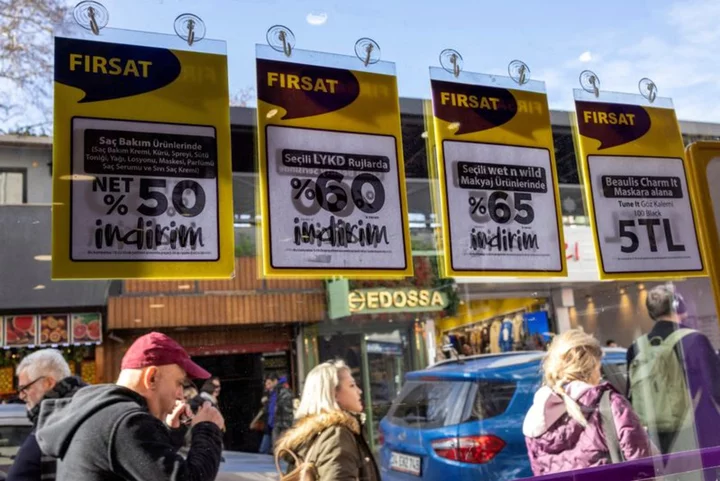By Nevzat Devranoglu and Orhan Coskun
ANKARA Turks will get little reprieve from a soaring cost of living this summer as economists expect prices to jump by as much as 8.5% in August, underlining Ankara's challenge as it embarks on a painful path toward more orthodox policies.
The sustained inflationary pressure, driven by a lira drop and tax hikes, comes as President Tayyip Erdogan's new finance minister and central bank chief orchestrate a policy U-turn including interest rate hikes that are expected to slow domestic demand.
The monetary tightening - after years of aggressive rate cuts - is meant to cool inflation by mid-2024. But in the meantime the U-turn has hammered the currency and left authorities asking already-stretched households for patience.
In July, consumer prices soared nearly 10% sequentially due to tax hikes and a lira crash. This month, forecasts by five economists show them rising between 5.5% and 8.5%, with fallout from mid-July tax hikes lagging into August.
The economists told Reuters that food prices would jump this month due to a July 16 fuel tax hike, which was meant to help fund a 1.12 trillion lira ($42.2 billion) rise in the budget after February's earthquakes and May elections boosted spending.
The tax rise sent petrol prices up 45% to 36 lira per litre. Separately this week, public transportation and taxi fares were raised by 51% in Istanbul, Turkey's largest city, with short-distance taxi fares up 75%.
Erdogan's previous drive to slash interest rates sent annual inflation soaring to a 25-year high above 85% last year and left the lira heavily state managed.
Yet after he was re-elected in May, Erdogan, facing an unstable economy and depleted reserves, named a new cabinet to reverse policy. The central bank under new Governor Hafize Gaye Erkan has since hiked rates by 900 basis points and the lira, freer to float, has plunged 26%.
ERDOGAN'S SUPPORT
Despite Erdogan's outspoken opposition to high rates in the past, Erkan has vowed to continue her gradual tightening.
Yet partly due to currency depreciation, the central bank expects annual inflation to rise until the second quarter of 2024 when it peaks above 60%, spelling more cost-of-living strains for Turks.
Erdogan publicly backs the goal of lowering inflation to single digits but said on Monday the government will at the same time "never compromise" on employment and economic growth.
Some analysts have questioned how far he will allow rates to rise and growth to slow, especially given nationwide local elections set for March, prompting Finance Minister Mehmet Simsek to stress that he has Erdogan's full support.
A Turkish official familiar with the matter said the gradual tightening aimed to preserve growth and avoid shocks to employment and the economy.
Moody's said it could raise Turkey's credit ratings if the shift to orthodoxy is sustained. Yet because it will slow growth, it said the "key challenge is to balance the need for decisive action...with the political imperative for continued robust economic growth."
BETTER DATA
Since Simsek and Erkan took the reins two months ago, economists say the Turkish Statistical Institute (TUIK) has published data with higher-quality price measurements.
The 9.5% monthly inflation reading in July "fully reflected the tax and fuel changes, marking a clear difference between the quality of June and July readings compared to those at the start of the year," said an economist who requested anonymity due to the sensitivity of the issue.
Since 2018, some economists and opposition politicians have criticised TUIK's data on grounds it did not match street prices.
After years of divergence with market expectations, the central bank matched those last month when it raised its end-2023 annual inflation forecast to 58.0% from a previous 22.3%.
(Writing by Daren Butler; Editing by Jonathan Spicer and Toby Chopra)

